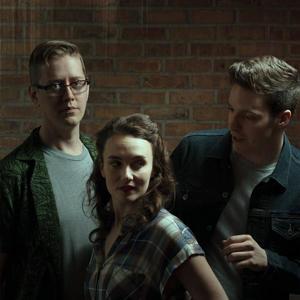
The dialogue between the young and the old, between the ages of opportunity and those of experience, between "Where am I going?" and "How did I end up here?" are conversations beguiling writers from the beginning of time. Two overlapping productions in this spring's festival of plays by Steven Dietz feature the prolific playwright speaking in both voices.
First opening is Promethean Theatre's Mad Beat Hip and Gone, which recounts the adventures of two Midwestern lads whose chance meeting with Jack Kerouac, the soon-to-be author of On The Road and icon of the Beat Movement in literature, spurs them to follow him to the urban frontiers of San Francisco. Next comes Remy Bumppo Theatre's Bloomsday, in which a pair of midlife adults recall a day long ago when a Dublin tour guide and an American backpacker spent an afternoon together, little guessing that it would determine their paths forever.
Likewise unexpected was the scheduling, virtually side-by-side, of two plays sharing both an author and a common theme. Admits Promethean artistic director Brian Pastor, "We had talked about doing [Bloomsday], but then discovered that Remy Bumppo had already secured permission. When we went back to the drawing board, though, we were still engrossed in the young-and-old dynamic, and that inevitably circled us back to Dietz and Mad Beat."
Production director Jess Hutchinson concurs, "The stories can be viewed as two sides of the same memory-play coin—both bend time to shape their narrative structure—but Mad Beat is also a "road" play. Its story has all the urgency of setting out into the wild unknown, and this drive to find meaning and purpose is something that continues to permeate our culture today. Are we on a cusp of social change like that occurring in 1947? And might reflecting on how we, as a nation, confronted social change in the mid-20th Century help us make the best choices now, as we careen into an uncertain future?"
If the youths in Mad Beat Hip and Gone can only imagine the conclusion of their voyages, the pilgrims in Bloomsday have already seen the book closed on their travel dairies, leaving them with no direction but into the past. Within that very premise, suggests Remy Bumppo producing artistic director Nick Sandys, lies its allure.
"We all wonder how our past decisions have forged the person we are now. Dietz takes advantage of theater's ability to collapse time into a single frame. Einstein would be proud—so would Joyce and Kerouac."
 Traveling back and forth through time can easily induce vertigo in unprepared audiences (cf. Tom Stoppard's Arcadia), but Hutchinson is unperturbed. "Mad Beat's premiere production utilized a bunch of highly specific cinematic projections, but Dietz has revised his script significantly since then, enabling us to rely on the text—and on the partnership between actor and audience that you find in Chicago's storefront culture—to create the magic taking us from Nebraska to California, and back again, at the speed of thought."
Traveling back and forth through time can easily induce vertigo in unprepared audiences (cf. Tom Stoppard's Arcadia), but Hutchinson is unperturbed. "Mad Beat's premiere production utilized a bunch of highly specific cinematic projections, but Dietz has revised his script significantly since then, enabling us to rely on the text—and on the partnership between actor and audience that you find in Chicago's storefront culture—to create the magic taking us from Nebraska to California, and back again, at the speed of thought."
The appeal of both plays to the baby-boom generations is obvious, but Hutchinson also insists, "There is something universal about our search to understand what we inherit, and what we make of ourselves, from the whole of our experiences. The journey resonates with all of us, whether we're just starting out, or we're at its midpoint, or we're looking back on the miles that brought us to our destination."
Sandys adds, "The brief romance providing the central action in Bloomsday is a moment that everyone can remember, whether it happened thirty years ago, or yesterday. Indeed, this is why Joyce, writing in 1918, chose to set Ulysses in 1904, on the day of his first date with the woman who would become his wife—a day he never forgot and that haunts him ever after." He smiles ruefully, "We should all be so lucky."
Mad Beat Hip and Gone opens May 4 and plays through June 1 at the Edge Off-Broadway.
Bloomsday opens May 20 and plays through June 22 at Theater Wit.
Mary Shen Barnidge
Contributing Writer

 Follow Us On Twitter
Follow Us On Twitter